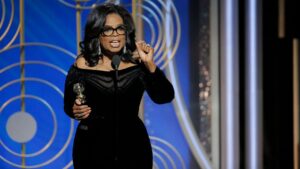by The Cowl Editor on January 18, 2018
Opinion

by Sarah Kelley ’18
Opinion Co-Editor
Anyone who watched Oprah Winfrey receive the Cecil B. DeMille Award for lifetime achievement at the Golden Globes last week cannot deny the powerful message of hope Winfrey championed within her speech.
But why did so many of us interpret that message as a potential run for presidency? And why was “Oprah 2020” an immediate response?
As the first black woman to have received this lifetime achievement award, Winfrey made a moving acceptance speech that eloquently synthesized a number of urgent social and political topics—from racial equality and the value of the press, to issues of sexual abuse and assault within the #MeToo movement, and the importance of women and all individuals speaking their truth and telling their stories.
She called for a break in our society’s dominant ideology, which for years has silenced women from telling their stories, has maintained a cultural status quo of abuse and inequality, and has allowed for the maintenance of powerful male interests at the cost of justice and truth.
Yet, in Winfrey’s championing of “a new day…on the horizon” and a future in which women “become the leaders who take us to the time when nobody ever has to say ‘Me too’ again,” not only did her speech bring audience members to their feet, but it also brought about countless forms of inquiry regarding a potential run for the presidency.
This kind of speculation about the political implications of Winfrey’s speech raises serious cause for alarm in terms of recognizing where we are as a society under the current political atmosphere if we easily perceive a celebrity’s speech in such a presidential context.
These interpretations of, and reactions to, Winfrey’s acceptance speech seem to shift the focus of her message away from the collective stories and truths that must be told, and towards Winfrey’s political potential as an individual. Within this shift, we are to some extent losing the significance of her powerful message.
Winfrey’s speech was not intended to draw attention to herself as an individual, it was intended as a call to action for all individuals, to raise awareness and create social change towards a more equitable and just society.
And while the issues raised by Winfrey’s speech are inextricably political, that does not necessitate a potential run for the presidency on her part.
The strong, immediate response of “Oprah 2020” to this acceptance speech seems in some way to reflect the shifting political norms of American society regarding the position of the presidency under the current political environment.
It is hard not to ask oneself whether President Donald Trump has really altered our political reality to such an extent that we would now readily accept another celebrity’s potential run for the presidency.
And while no one can deny the brilliance and success of Winfrey as a businesswoman, actress, producer, and philanthropist—and overall human being—we also cannot deny her general lack of political experience.
The power of Oprah’s speech should remind us that we must all do our part to invoke and sustain social change in the U.S. Yet that does not mean that we should begin to readily fall back on celebrities as possible political leaders.